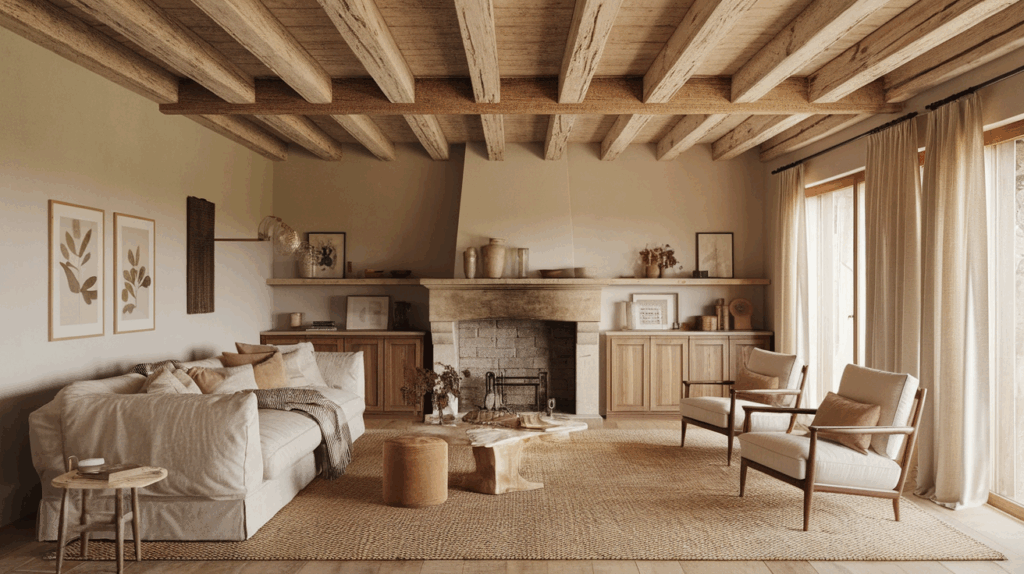You want your home to feel cozy yet fresh, and rustic interior design helps you strike that balance between warm character and modern ease.
In this blog, I will share some creative ideas for combining old‑world materials like reclaimed wood or stone with sleek, clean modern pieces.
You get ideas for furniture, textures, lighting, color, décor, and layout. Each one shows how you can bring rustic charm into a modern space, without making it look dated.
By the end, you feel ready to add personality and warmth to your home in ways that feel both current and inviting.
It’s not about decorating like a cabin; it’s about adding texture, depth, and comfort. Rustic style makes a room feel lived in and loved.
You get that relaxed, cozy feel with just a few thoughtful design choices.
How to Blend Modern and Rustic
You don’t need a full farmhouse or outdated décor to lean into rustic charm. Start by mixing one or two natural elements, reclaimed wood shelving, stone accent, or exposed beam, with modern minimalist furniture.
Keep colors neutral, let textures show, and balance open space with cozy items like linen pillows or leather accents.
Be intentional: pair rough wood with smooth surfaces, steel lighting with soft textiles, vintage finds with clean lines.
These small moves bring warmth, visual depth, and timeless appeal to any room.
It’s all about contrast that feels balanced, not busy.
Rustic doesn’t mean clutter; it means character. You can start small and build a layered space that feels collected, not staged.
Rustic Interior Design Ideas
Rustic design blends raw materials, earthy tones, and handcrafted elements to create cozy, natural spaces.
These ideas help bring warmth and texture into your home without losing function or comfort.
1. Reclaimed Wood Walls
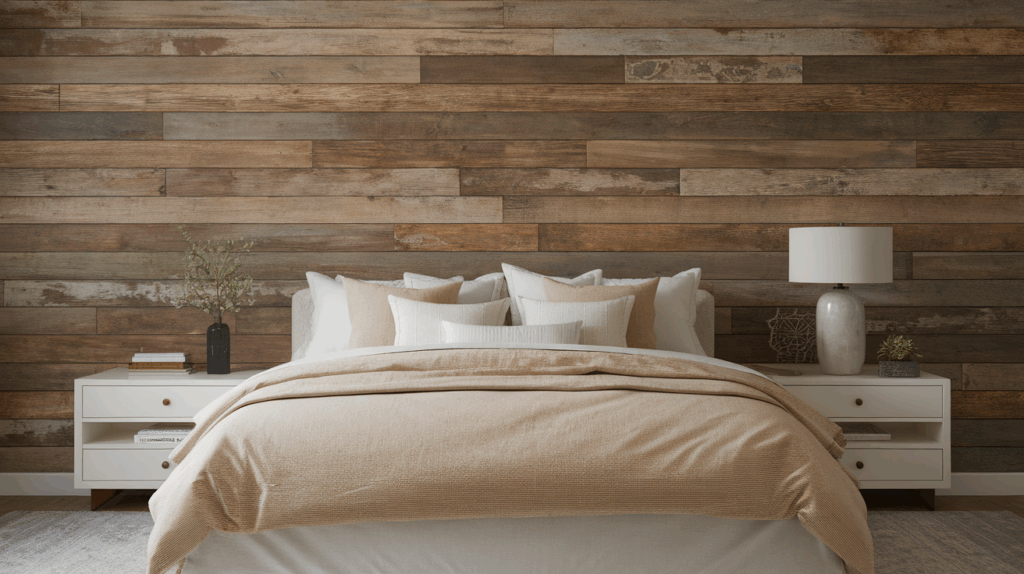
Install a reclaimed wood accent wall for instant warmth and texture. The imperfections in the planks give personality and age to your space.
I like using this behind beds, fireplaces, or entryways. It’s an affordable way to bring rustic charm into any room.
Choose grays, browns, or whitewashed wood based on your style. You can apply the planks with nails or adhesive strips, making it a doable weekend project.
2. Exposed Ceiling Beams
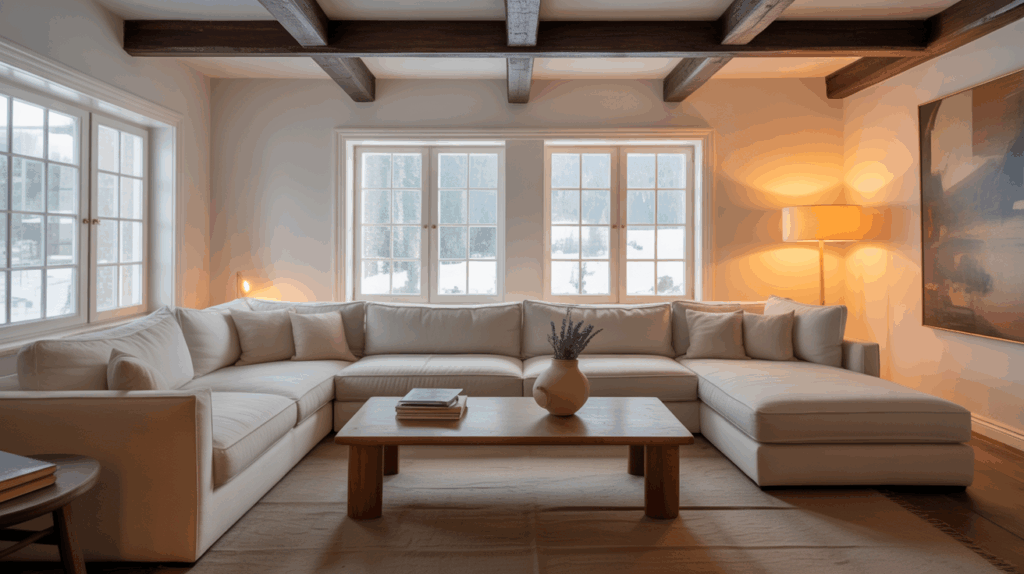
Keep your ceiling beams visible to enhance the rustic look. Even faux beams add depth and character without the weight of real wood.
They work well in open-concept spaces or small living rooms where texture matters. I recommend staining them in natural wood tones for contrast.
Pair them with soft lighting or white walls to keep the space open and inviting.
They draw the eye upward and make ceilings feel higher. You can even add reclaimed wood for extra authenticity.
3. Stone Fireplace Surround
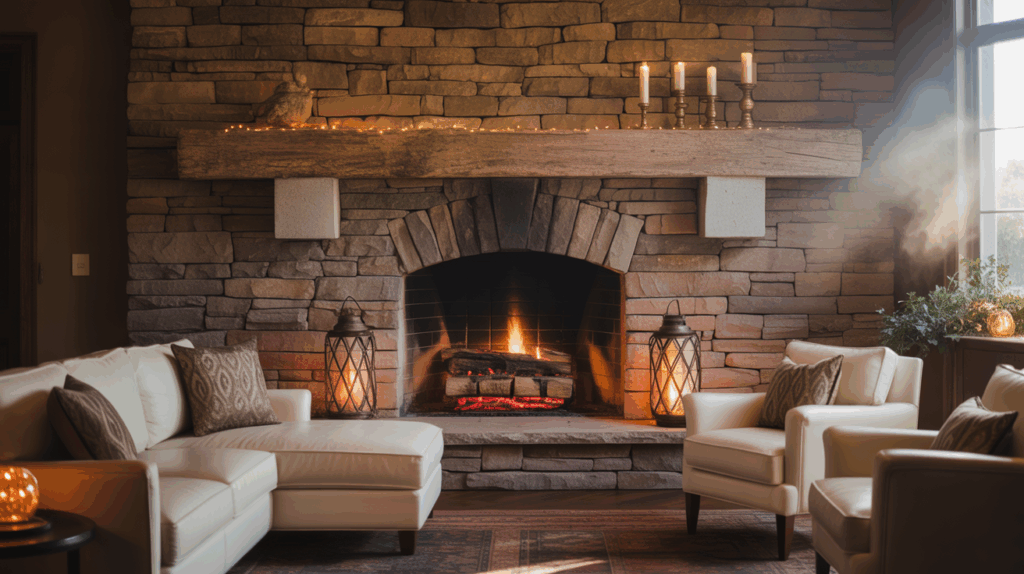
Use stacked stone or river rock around your fireplace to create a cozy focal point. A rustic hearth works well in living rooms and dens. If you don’t have a fireplace, install an electric unit with a faux surround.
The mix of rugged stone and wood mantels adds comfort and charm. Finish it with a few candles, framed art, or a wooden mirror above.
This instantly warms up any room. It also becomes a natural gathering spot for relaxing evenings.
4. Farmhouse-Style Furniture
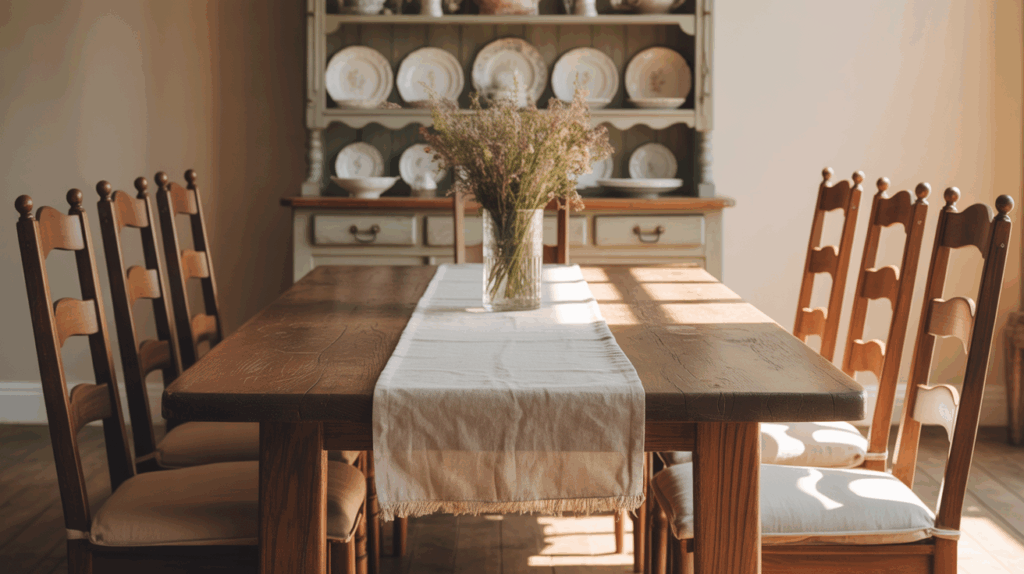
Choose chunky wood furniture with simple lines, think pine or oak tables, ladder-back chairs, and vintage hutches. I look for pieces with rough textures or weathered finishes.
Mix in neutral upholstery like linen or cotton for softness. Farmhouse furniture holds up well and grounds the room with a lived-in look. You can thrift or refinish pieces yourself to keep it affordable.
A well-worn piece tells a story and adds heart to your space. It keeps the style approachable and warm.
5. Textured Throw Blankets
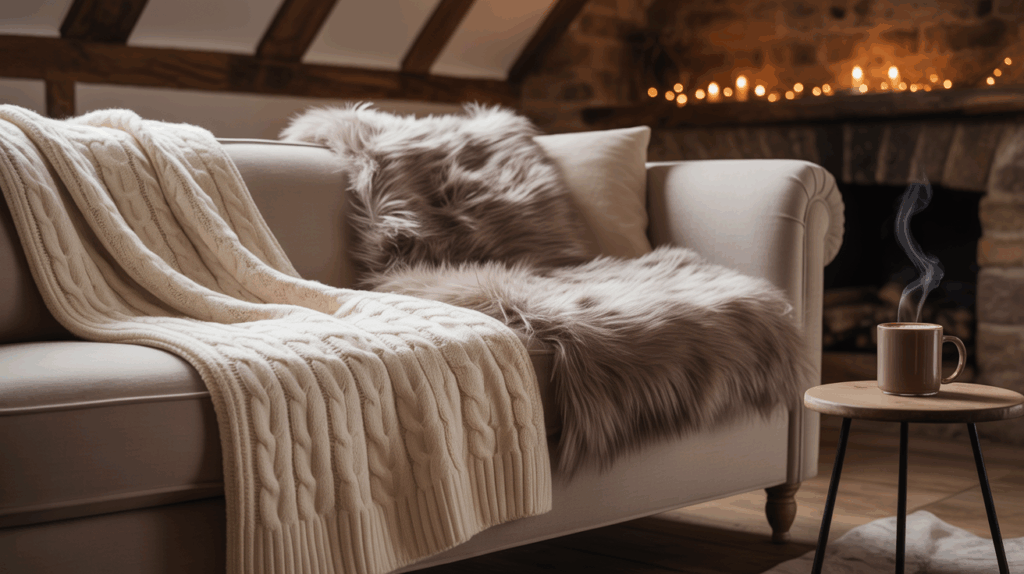
Add warmth with cable-knit throws, wool blankets, or faux-fur accents. I toss one over the back of a couch or layer two at the foot of a bed. Stick with neutral tones like tan, ivory, or gray for a timeless feel.
These small touches instantly soften hard materials like wood or stone and make your space feel more inviting.
I rotate them seasonally for color and comfort. They also add depth and softness to leather or linen furniture.
6. Iron or Black Metal Accents
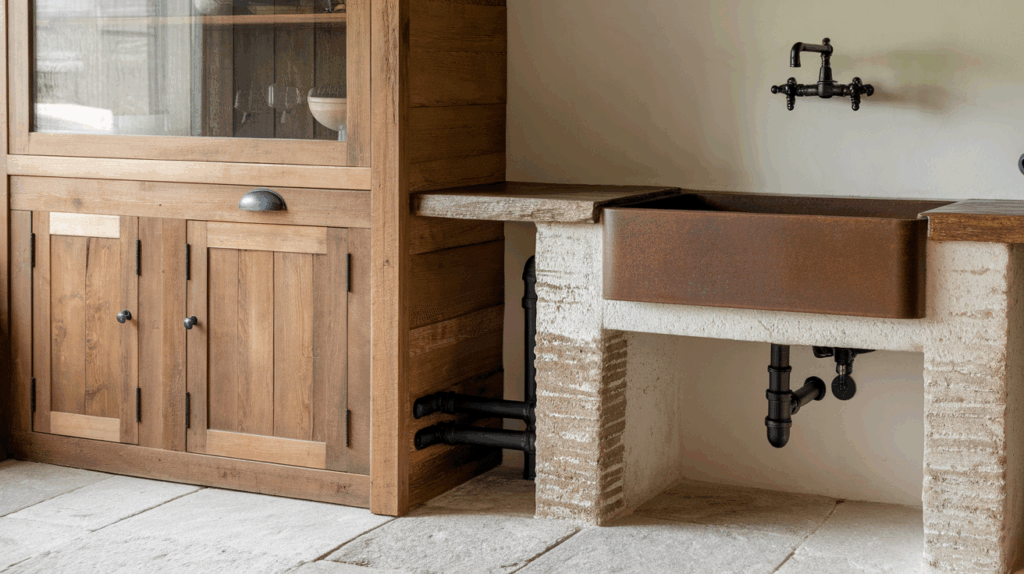
Balance all the warm wood with a bit of contrast. Use black metal on light fixtures, cabinet handles, or curtain rods. I like the industrial touch this brings to a rustic room.
Go for matte finishes to avoid anything too modern or shiny. The dark metal keeps the look grounded and highlights wood tones.
Try mixing black with aged brass for extra dimension. It adds a masculine edge without feeling cold or harsh.
7. Open Wood Shelving
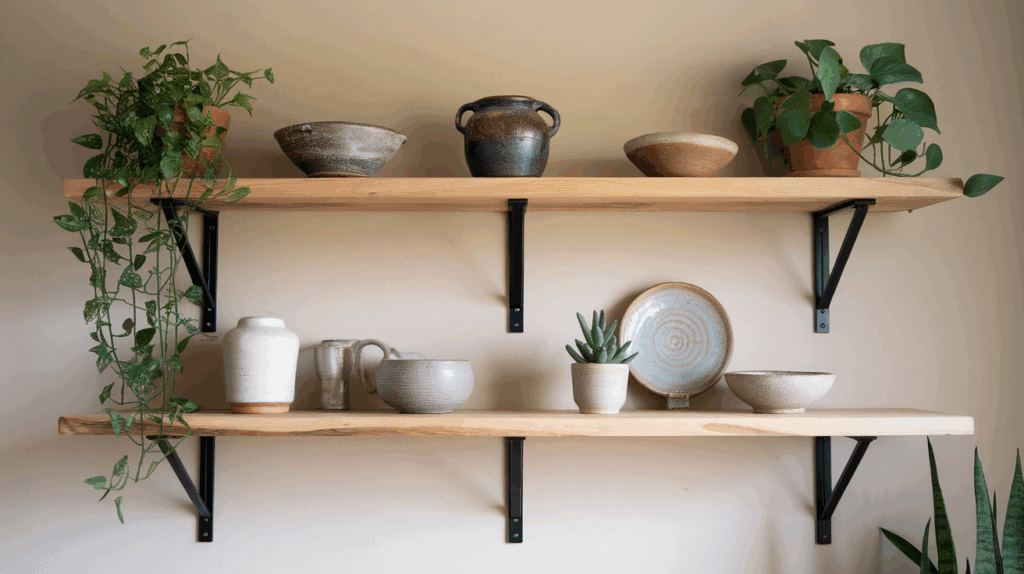
Open shelves made from raw or stained wood add rustic appeal and give you space to display pottery, plants, or vintage finds. Mount them in kitchens, bathrooms, or hallways. Use wrought iron or black brackets for added contrast.
I keep mine clutter-free by sticking to a neutral palette and grouping items by height or color.
You can even mix in baskets for texture and storage. The look is both functional and full of character.
8. Vintage Rugs with Earthy Colors
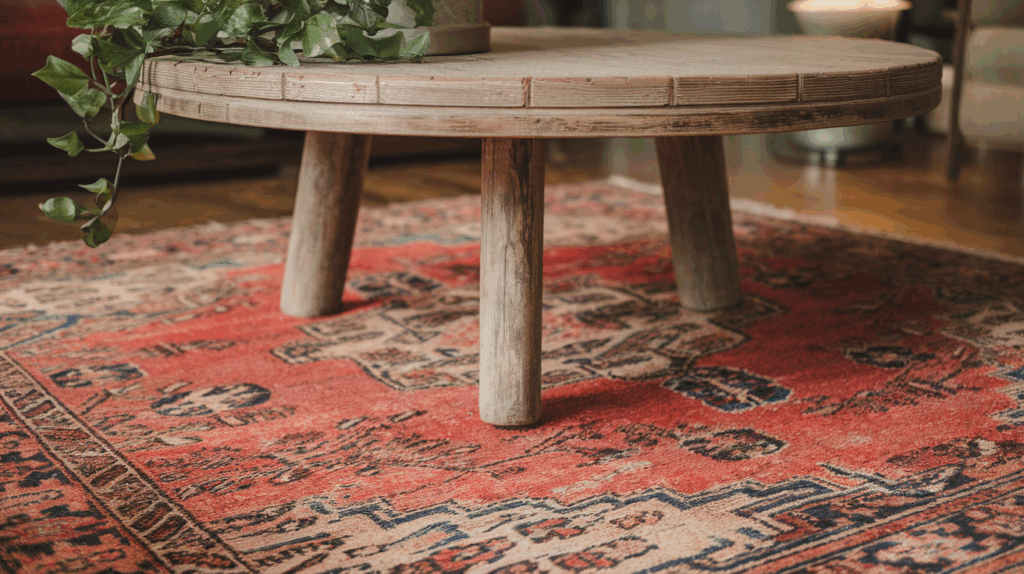
Lay down a faded or Persian-style rug in reds, browns, or muted blues. It adds age, color, and comfort underfoot. Rugs soften wood or stone floors while tying in natural hues.
I like using vintage-style rugs in kitchens or under dining tables; they look lived-in and hide dirt better than solid-color options.
Look for distressed patterns with floral or geometric prints. These rugs age beautifully and add instant charm.
9. Linen or Cotton Curtains
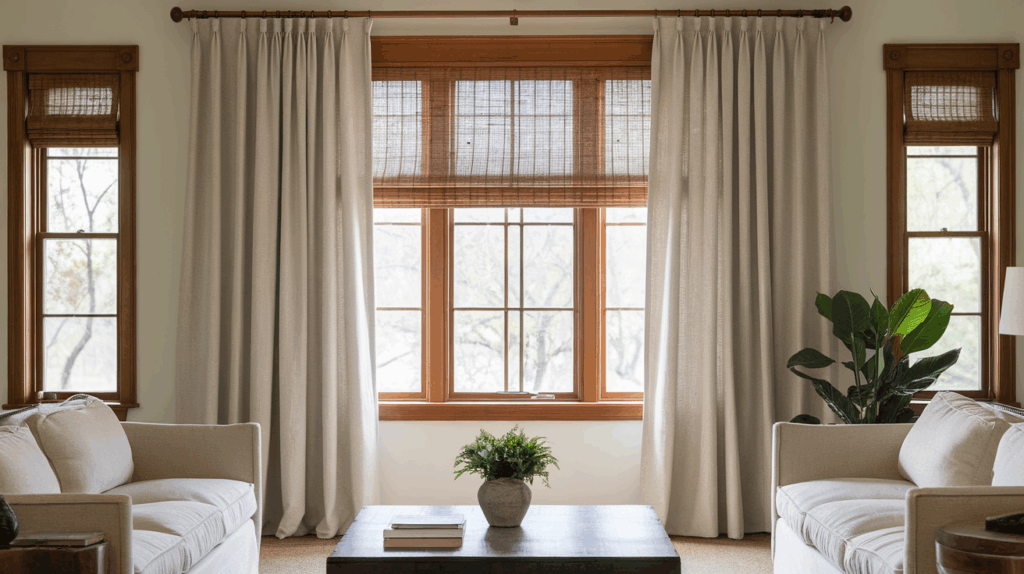
Hang simple curtains in natural fabrics like linen, cotton, or canvas. I use soft whites, beiges, or warm grays to keep things relaxed and rustic. Skip patterns or anything too shiny.
These fabrics drape nicely and filter light without blocking it completely. They also pair well with wood trim and natural window frames.
Layer them with bamboo shades for extra texture. They keep things cozy without feeling heavy.
10. Mason Jar Lighting Fixtures
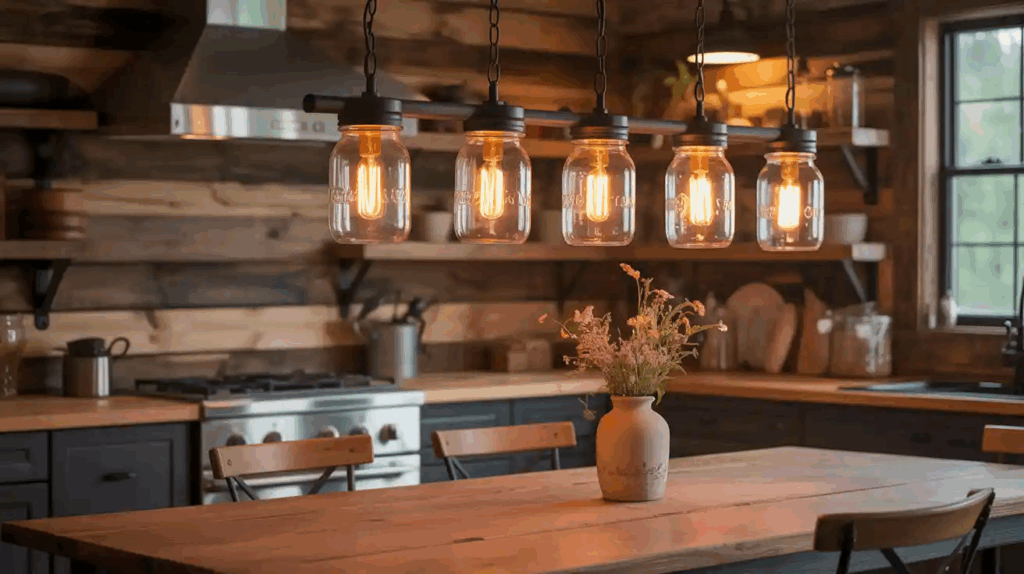
Replace modern fixtures with mason jar pendants or wall sconces. These give a handcrafted, down-to-earth feel to kitchens, hallways, or bathrooms.
I like the soft glow they offer with Edison-style bulbs. You can buy ready-made options or DIY your own for a budget-friendly update.
Hang them with black cords or metal chains to keep the rustic look strong.
11. Butcher Block Countertops
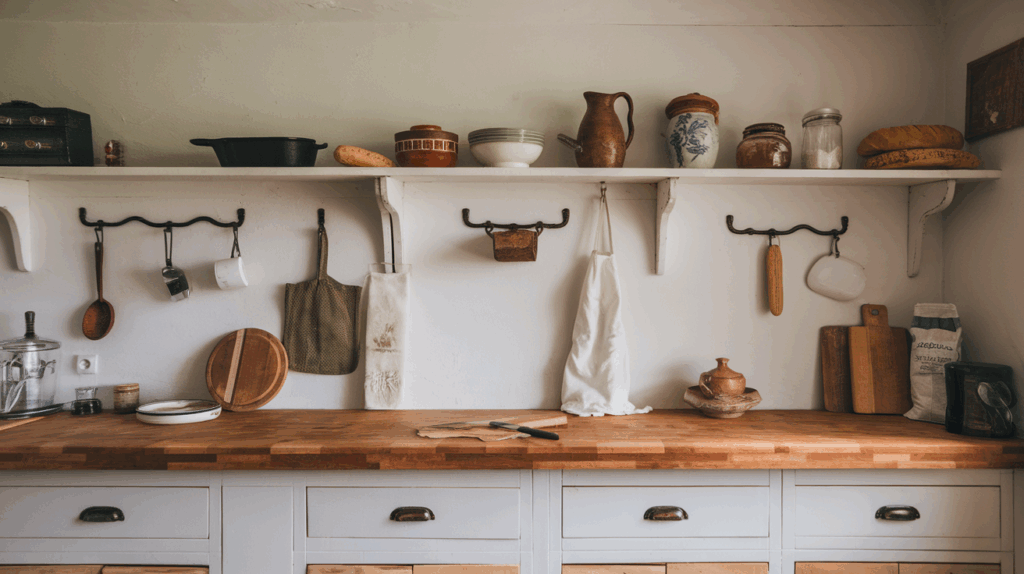
Install butcher block countertops to bring natural warmth into your kitchen. The wood surface adds texture and depth while staying practical for prep. I seal mine regularly to keep it water-resistant and long-lasting.
Butcher block looks great with white cabinets or open shelving. It’s a more affordable option than stone and matches perfectly with rustic or farmhouse elements like apron sinks, vintage lighting, or iron hardware.
I love how it ages gracefully over time.
12. Sliding Barn Doors
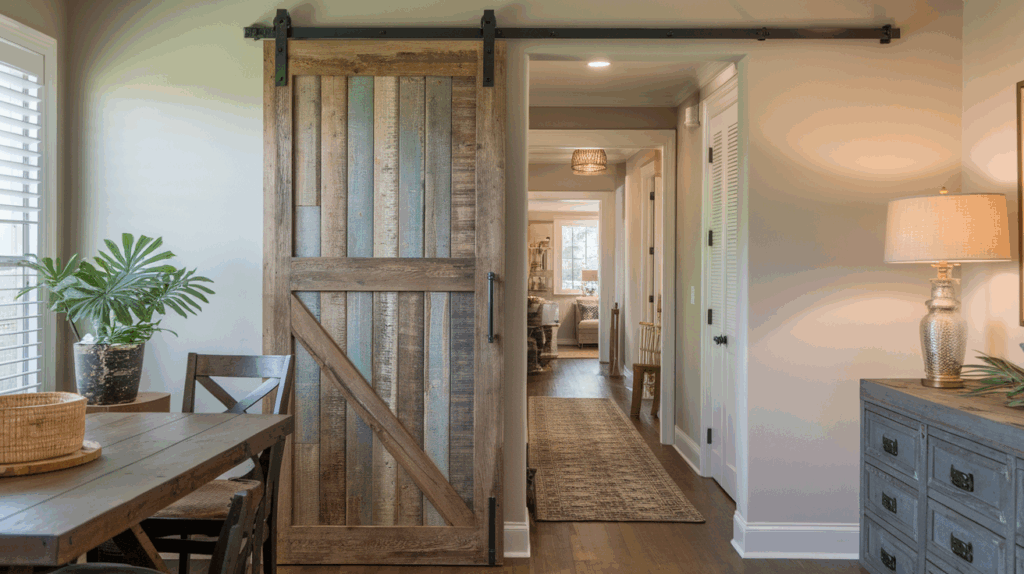
Replace a traditional door with a sliding barn-style version made from reclaimed wood. These add texture, charm, and function. I use them for closets, bathrooms, or as room dividers.
They slide smoothly and save space compared to swinging doors. Add black metal tracks to finish the rustic look. You can customize the finish with stains or paint, depending on your room’s color palette.
It’s a small change that gives a big visual impact.
13. Antique Mirrors with Wood Frames
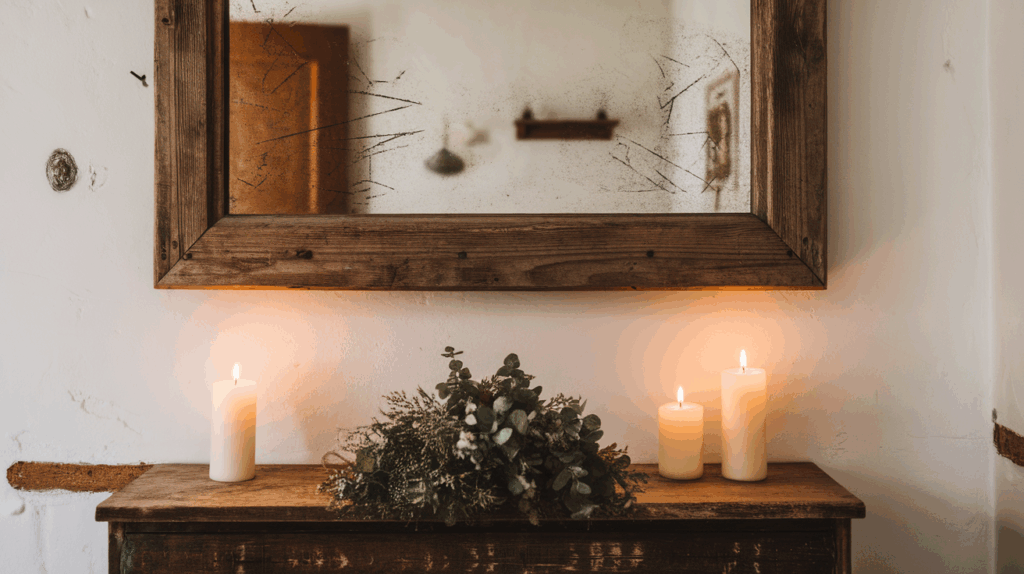
Hang an antique or distressed wood mirror to reflect light and add depth. I like using one above the fireplace, bathroom vanity, or in the entryway. A chunky wood frame with knots and grain brings authenticity and rustic appeal.
Look for salvaged wood or refinish a thrifted mirror. This pairs beautifully with other natural textures and soft fabrics.
It’s also a great way to make small rooms feel larger without changing much else.
14. Neutral Color Palette
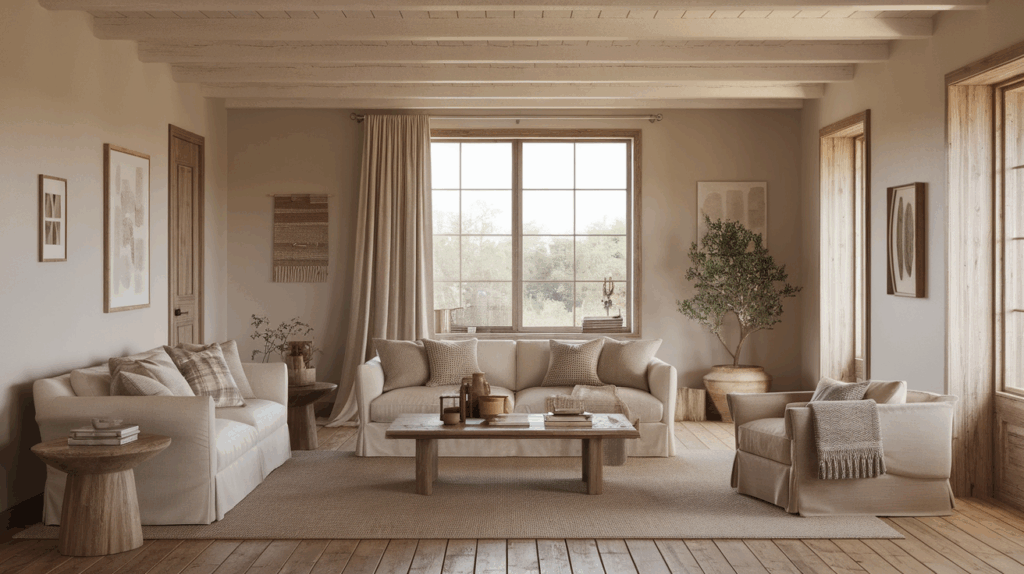
Use soft, muted tones like beige, taupe, cream, and gray as your base. These colors let wood textures and stone accents stand out. I keep walls and upholstery light while layering in darker woods and iron finishes.
Neutral palettes make the space feel calming, open, and cohesive. You can always add warmth through textures, textiles, or seasonal decor.
With neutral tones, I find it easier to mix rustic and modern pieces without clashing.
15. Leather Accent Chairs
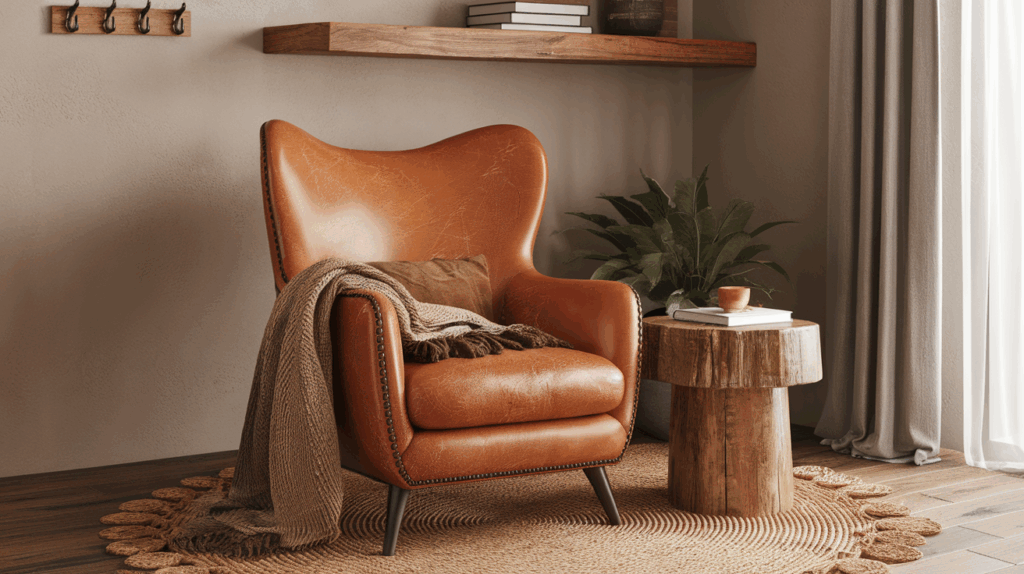
Bring in a distressed leather chair or bench to add richness and contrast. I like warm brown tones for a worn-in look that feels grounded. Leather adds texture and breaks up all the wood and fabric in rustic spaces.
Pair it with a knit throw or soft cushion to balance out the firmness. These pieces work great in reading corners, bedrooms, or entryways.
Choose simple shapes to stay true to the rustic vibe.
16. Galvanized Metal Decor
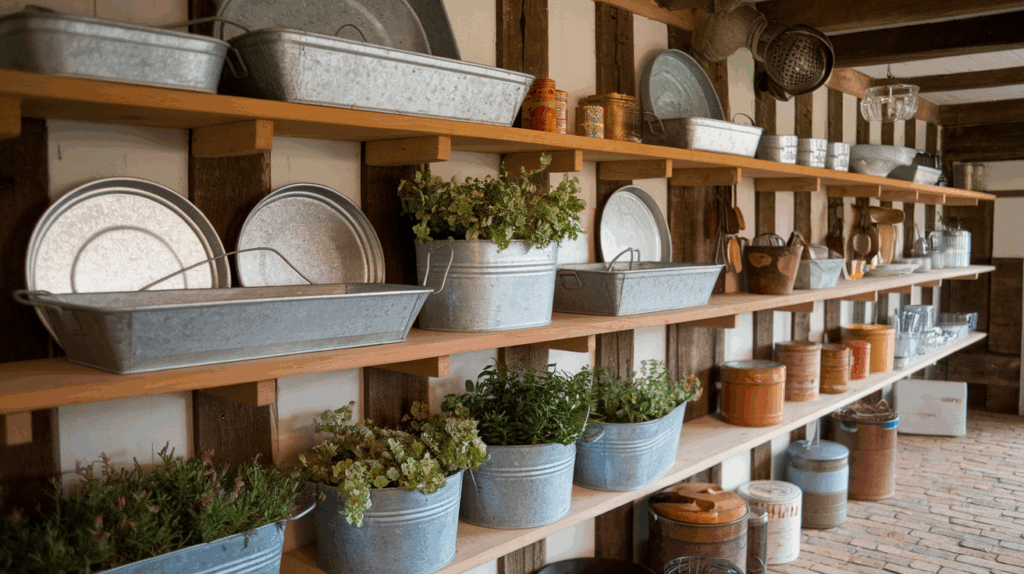
Mix in galvanized trays, buckets, or pendant lights to add industrial texture. I use these accents in kitchens, mudrooms, or even as planters.
Galvanized metal pairs nicely with wood and adds a touch of shine without looking modern or polished. These pieces often come distressed already, which works well for rustic interiors.
You can thrift them or buy new items with a vintage look. Keep it simple and repeat the finish in a few places.
17. Rustic Wall Art
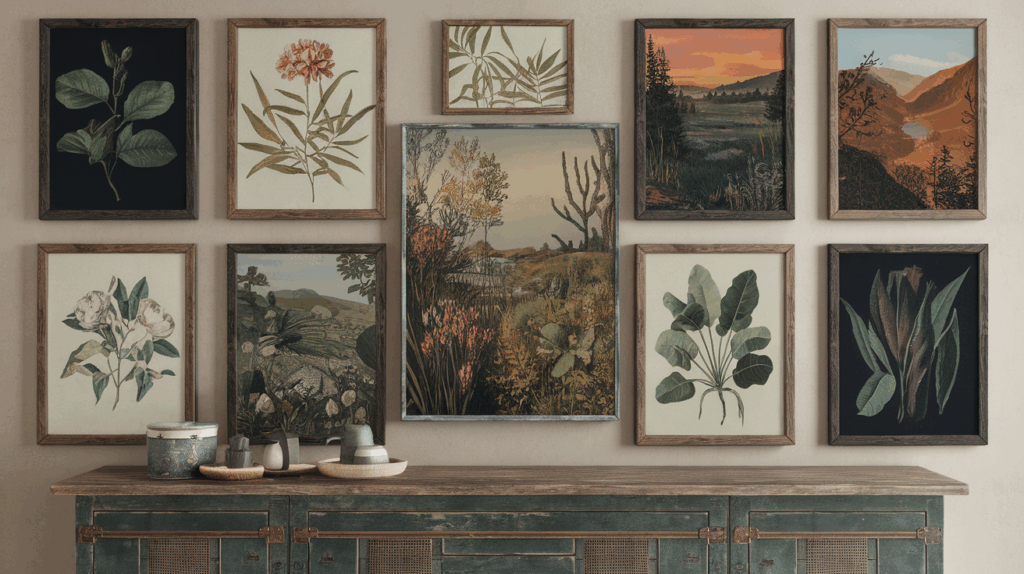
Hang art that features natural landscapes, botanical sketches, or vintage prints. I prefer wooden frames with a weathered finish to stay on theme.
You can also use pressed flowers, fabric swatches, or old maps for texture. Hang in groups for a gallery wall effect, or let a single large piece anchor the room.
Rustic art brings a personal touch to blank walls and ties together your color palette and design style naturally.
18. Wool or Jute Area Rugs
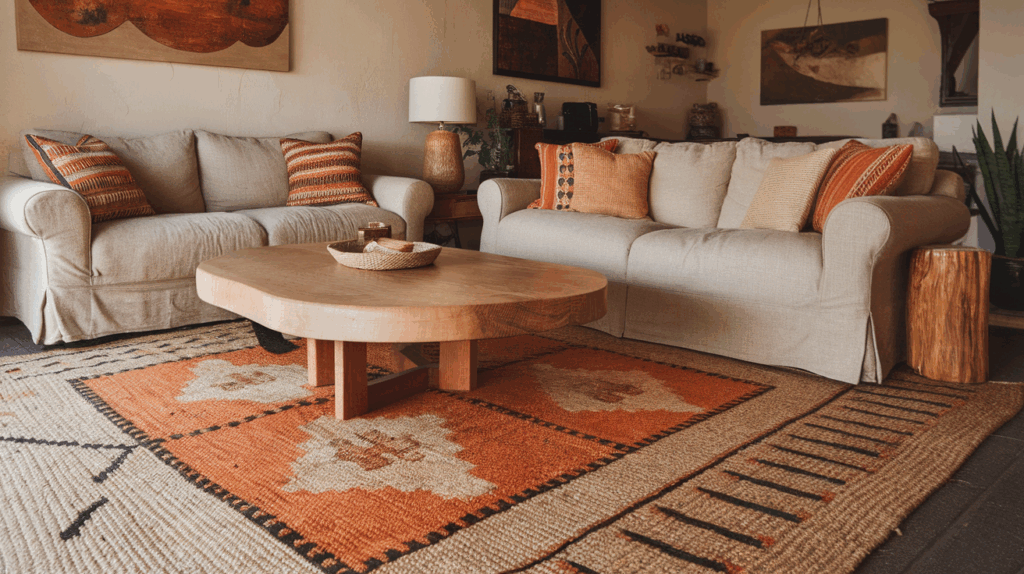
Layer wool or jute rugs for softness and structure. I love using these rugs to break up hardwood floors and define seating areas. Jute offers an earthy, rough texture while wool gives warmth and comfort.
Choose muted colors or natural tones to blend with your rustic palette. These rugs are durable and hold up well in busy areas like living rooms and hallways.
They also layer well under furniture for a grounded look.
19. Wooden Ceiling Planks
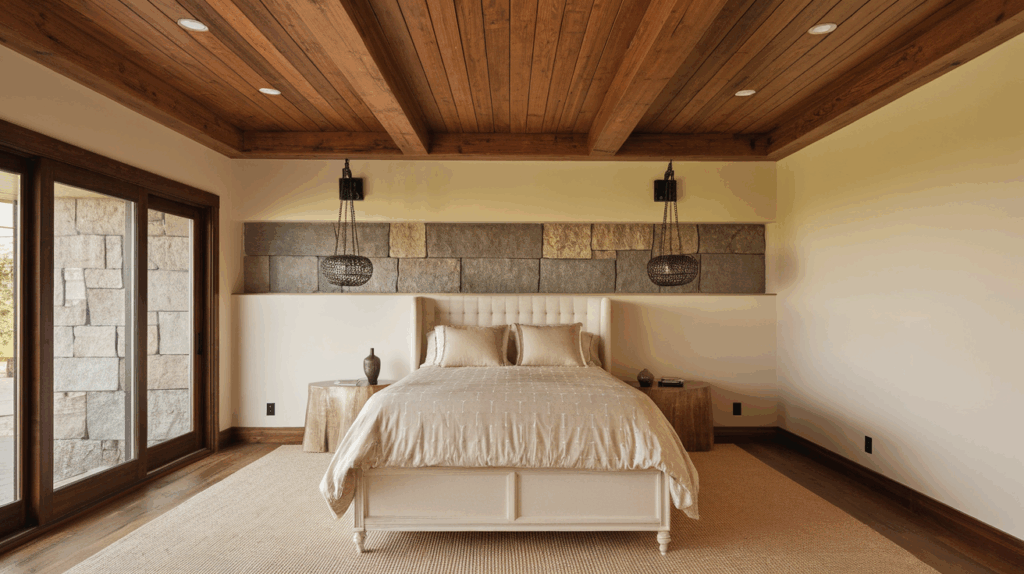
Add wooden planks or panels to your ceiling to warm up a room from above. I like using tongue-and-groove boards stained in walnut or oak for a classic cabin feel.
This feature works especially well in open living areas, bedrooms, or kitchens. Wooden ceilings draw the eye up and give character to plain white drywall.
Pair them with black lighting fixtures or exposed beams for extra drama and a cohesive rustic finish.
20. Built-In Open Storage
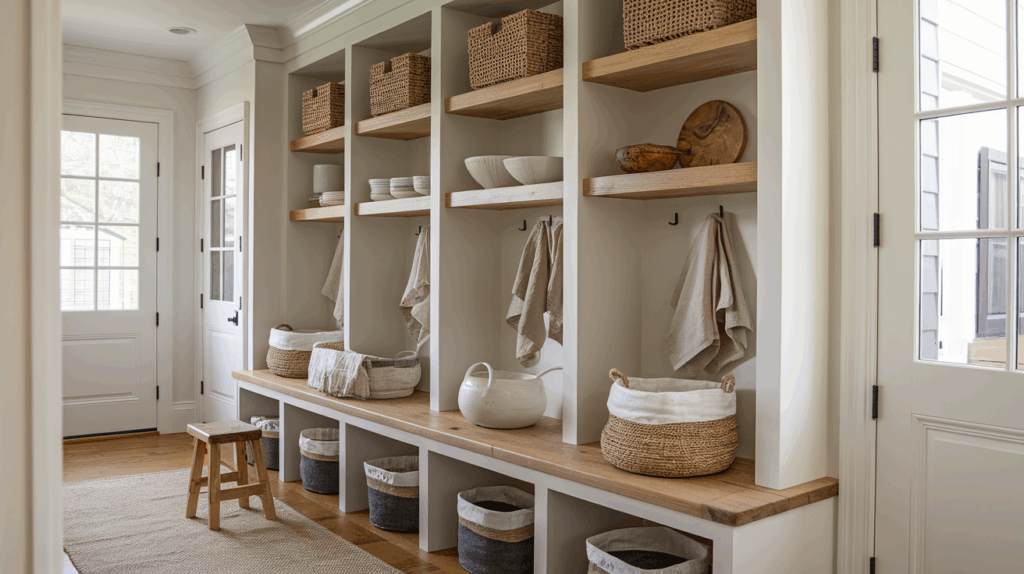
Design built-in shelves or nooks using reclaimed or raw wood. I like including these in kitchens, bathrooms, or mudrooms to show off functional items like dishes, towels, or baskets.
Open storage lets you style with purpose, showcasing everyday items as décor. You can vary shelf heights for interest or keep them symmetrical for balance.
The wood’s tone adds instant warmth, and the open style fits the relaxed, welcoming vibe of rustic design.
21. Hanging Lantern Lights
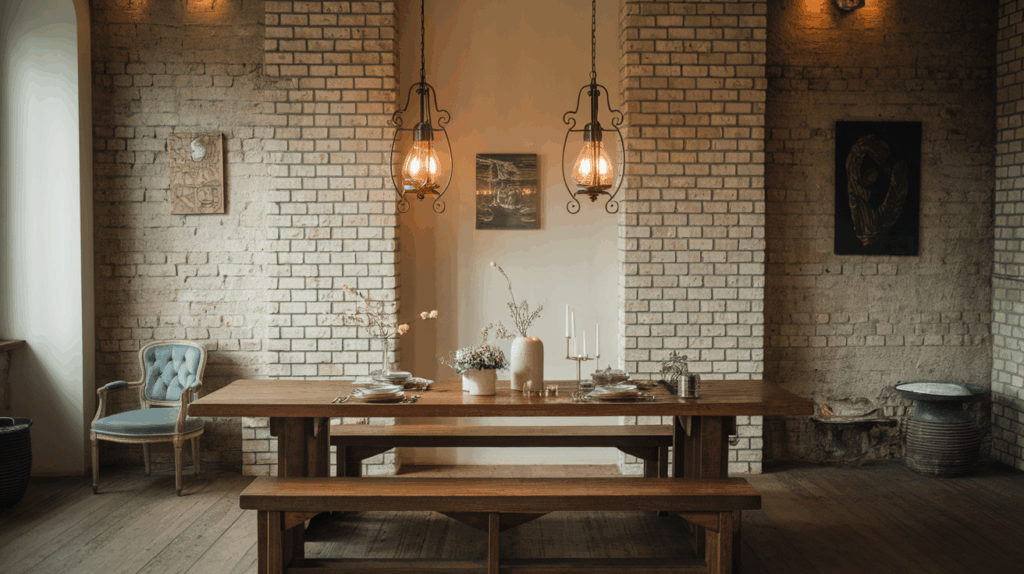
Replace standard ceiling lights with rustic lantern-style fixtures. I like lanterns with black iron or bronze finishes that mimic old oil lamps. They cast a warm glow and bring character to dining rooms, entryways, or porches.
Choose glass panes for a softer light or exposed bulbs for a farmhouse edge. These lights instantly ground your space with charm.
I hang mine slightly lower over tables or counters for a cozy, intimate feel that suits rustic interiors perfectly.
22. Distressed Cabinetry
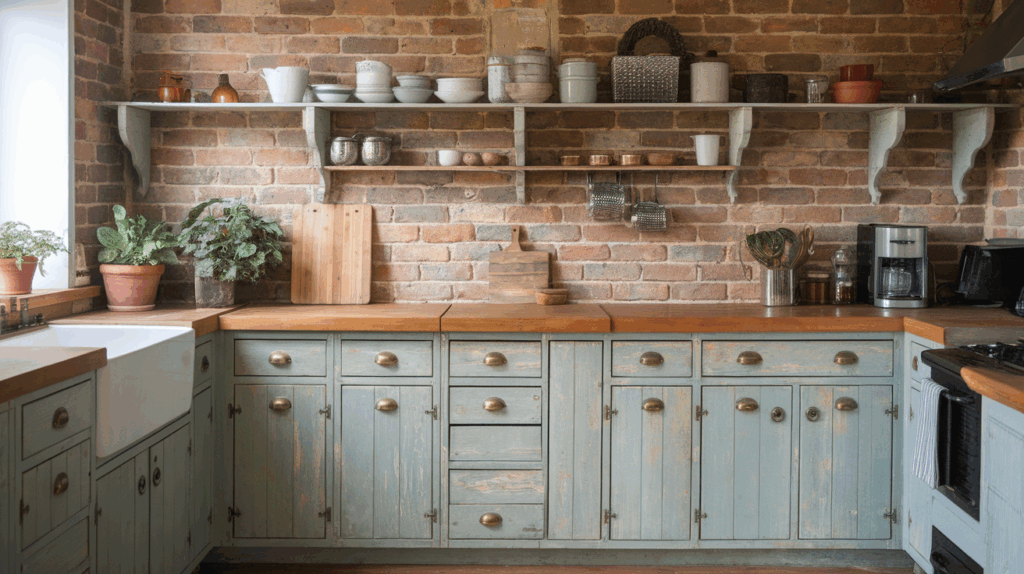
Use distressed or lightly weathered cabinets in your kitchen or bathroom for an authentic rustic finish. I choose cabinets with visible grain, uneven paint, or hand-scraped surfaces. It adds texture and makes new pieces feel like they’ve been there forever.
White, gray, or light blue painted finishes work well, too. Pair with dark hardware for contrast.
These cabinets are a great middle ground if you want something rustic without going full reclaimed wood.
23. Exposed Brick Walls
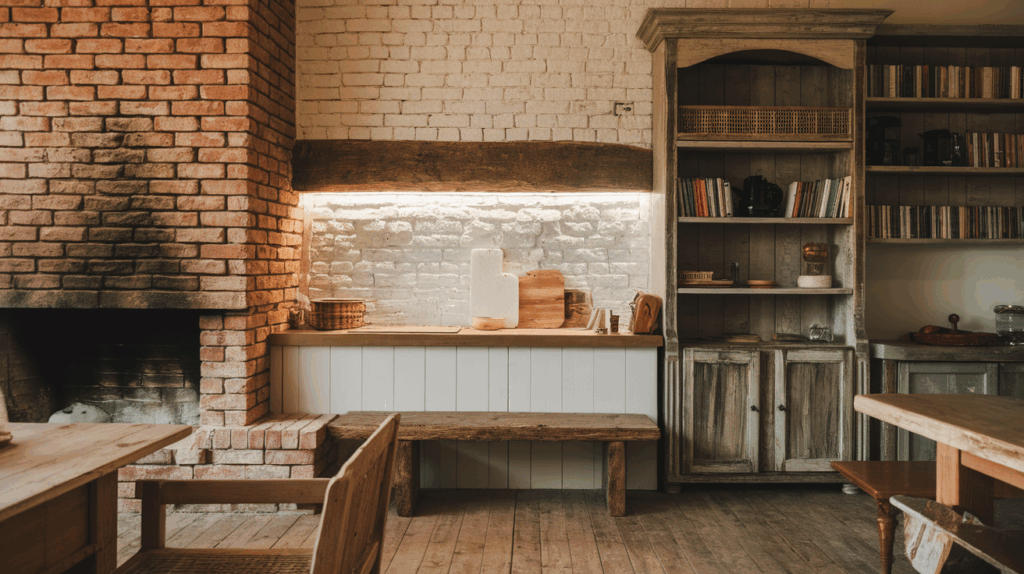
Leave interior brick exposed to bring texture and raw beauty into your space. I like sealing the brick with a matte finish to keep its natural look.
Red or whitewashed brick works well behind fireplaces, kitchen backsplashes, or in entryways. It adds warmth and vintage character without any extra decoration.
Pair it with soft furnishings and wood accents to avoid the space feeling cold or industrial. Brick is an instant focal point that never feels out of place.
24. Copper Accents
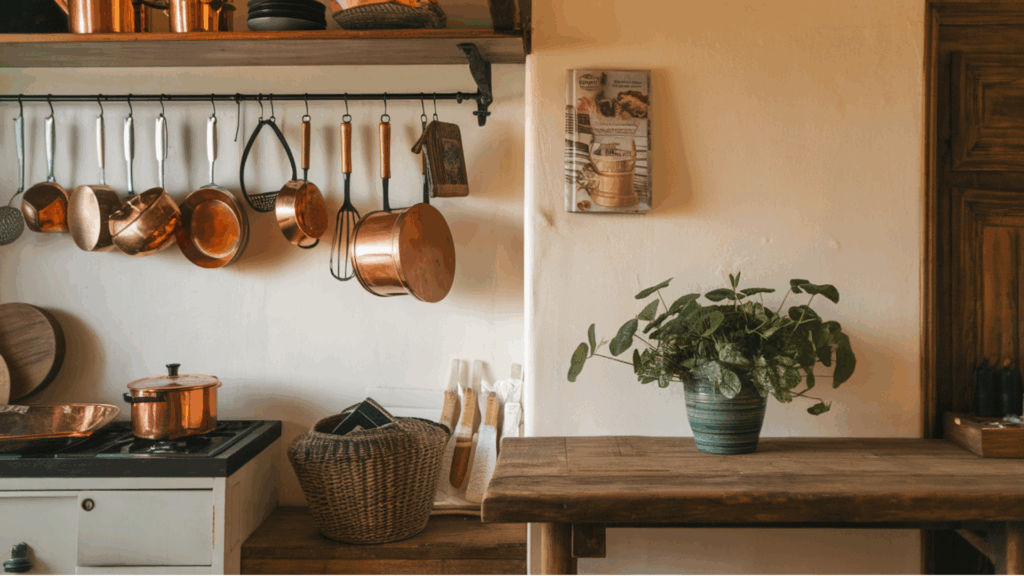
Add copper in the form of cookware, lighting, or bathroom fixtures. I like how it patinas over time and feels earthy and bold. Copper blends beautifully with wood and stone and adds warmth.
Use it for cabinet pulls, vent hoods, or even a freestanding tub if you’re feeling ambitious.
Even a few small copper trays or canisters give your space a rustic upgrade. It’s a great way to contrast cooler materials like concrete or iron.
25. Vintage Clocks or Signs
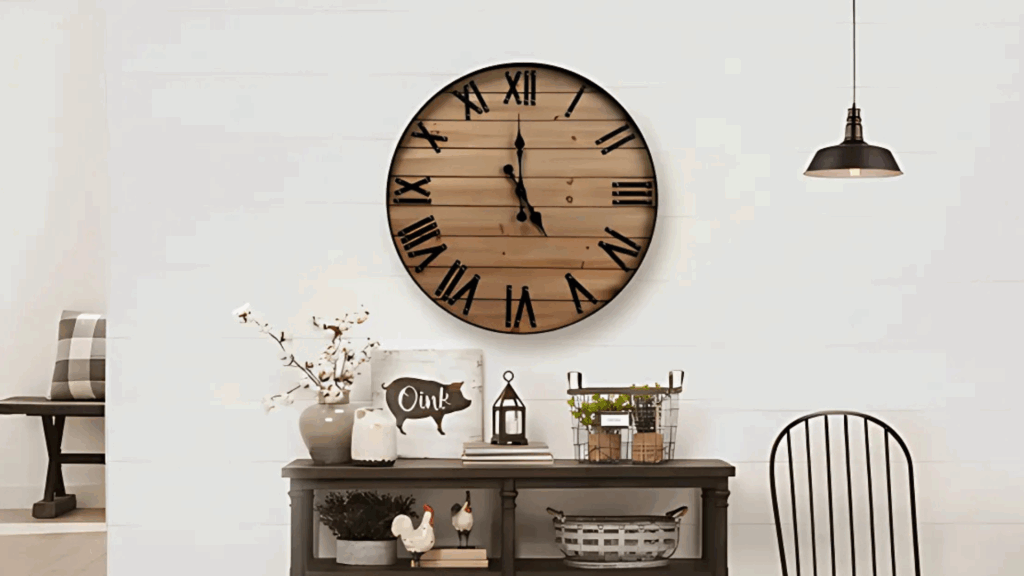
Decorate with oversized vintage wall clocks or old metal signs with a worn finish. I like to hang these over fireplaces or as anchors in entryways. They give a hint of nostalgia and tie in rustic with a little personality.
Look for pieces with aged paint, wood backing, or faded lettering.
You can thrift them or even DIY one using reclaimed materials. These wall accents keep the look relaxed and collected without feeling too formal.
26. Farmhouse Sink
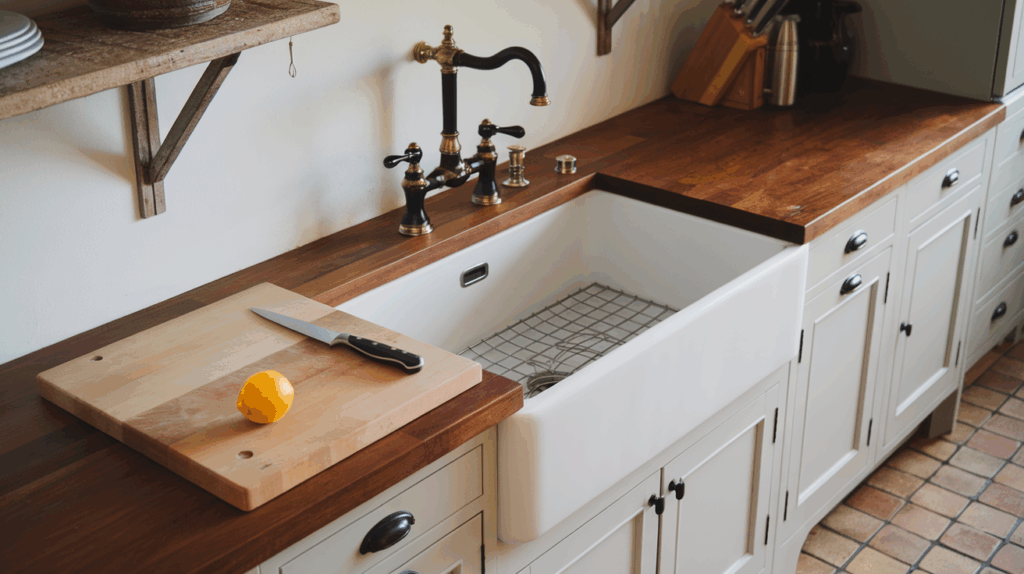
Install a farmhouse apron-front sink in your kitchen or laundry room for instant rustic flair. I love how deep and functional these sinks are. Choose fireclay or stainless steel, depending on your overall look.
Pair it with vintage-style taps or a bridge faucet in black or brass.
The sink’s exposed front brings in classic farmhouse style and pairs beautifully with butcher block or stone countertops. It’s one of those upgrades that’s practical and timeless.
27. Cozy Window Seats
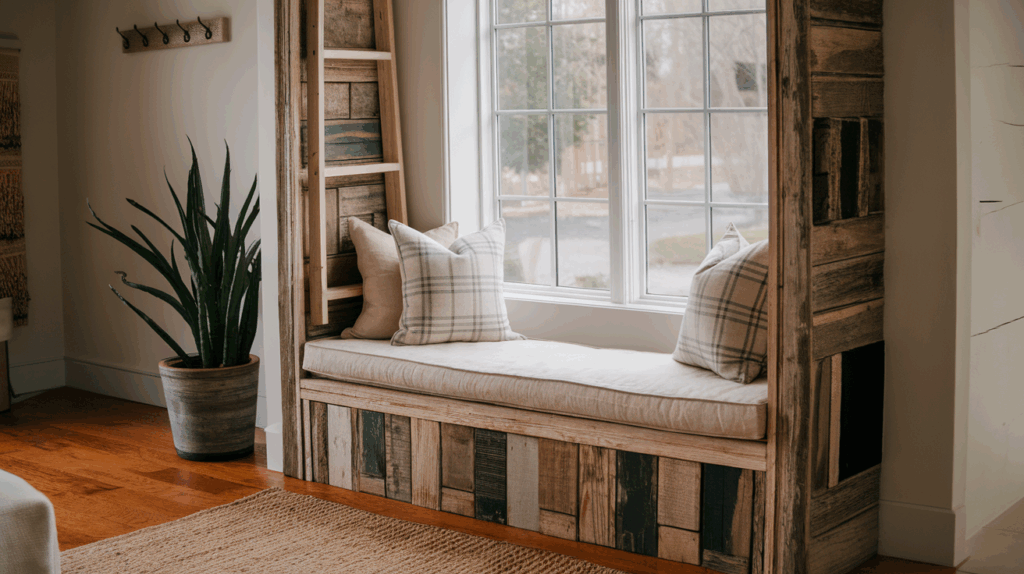
Build a window seat with a cushion and rustic wood framing. I like tucking mine into a living room nook or under a large window in the bedroom. Add throw pillows and a plaid or linen cushion to keep it soft and inviting.
It becomes a perfect reading spot or place to enjoy morning coffee.
The built-in look adds character and function, and using reclaimed or aged wood makes it blend seamlessly into your rustic layout.
28. Wrought Iron Hardware
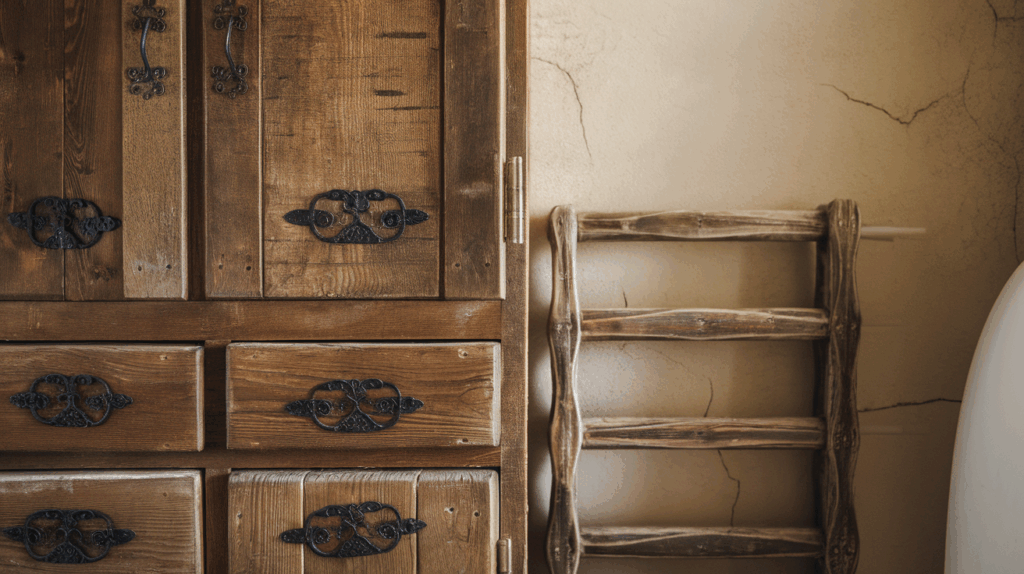
Replace modern cabinet knobs, door handles, and curtain rods with wrought iron versions. I like using black iron with a hammered or matte finish; it’s simple, strong, and fits right into a rustic setting.
You don’t need to change all the hardware; just swapping a few pieces makes a difference. It adds weight and authenticity to wooden furniture and doors.
Pair with reclaimed wood or distressed finishes to make it pop without overdoing it.
29. Neutral Paint Colors
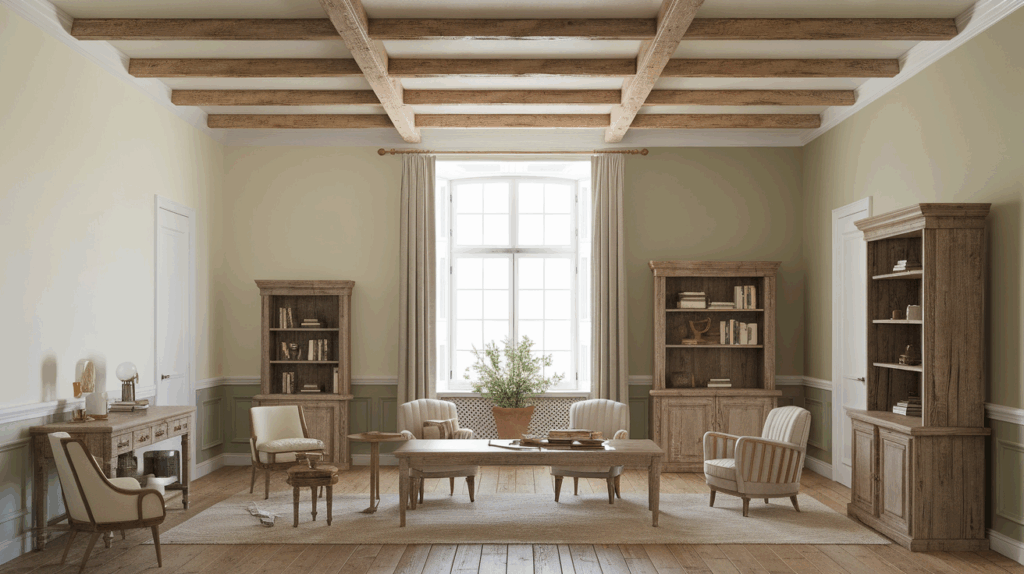
Stick with a natural paint palette to let your textures and materials shine. I use soft whites, creams, warm grays, and muted greens or blues. These tones keep the room grounded and never feel harsh.
Avoid super glossy or ultra-saturated paints; they clash with rustic finishes. A matte or eggshell finish works best on walls.
These shades give a cozy feel and let wood tones, vintage furniture, and metal accents take center stage without visual clutter.
30. Handcrafted or DIY Décor
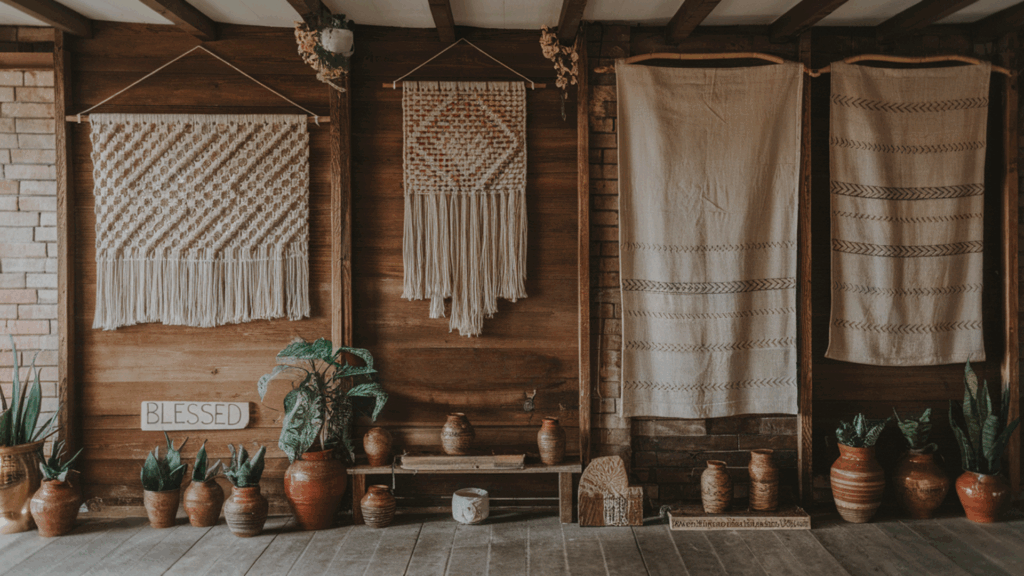
Incorporate handmade touches, wood signs, woven wall hangings, pottery, or stitched textiles. I like mixing in pieces I’ve made or picked up from markets and craft fairs.
They add personality and give your rustic interior a real, lived-in feel. DIY projects also keep the look affordable and personal.
Even a simple handmade shelf, macramé hanger, or wooden tray adds charm. These handcrafted elements celebrate simplicity, honesty, and creativity, core values of rustic design.
Mistakes to Avoid When Designing a Rustic Space
Rustic design should feel natural, warm, and lived-in, not overdone or chaotic. Here are the key mistakes I avoid to keep the style fresh and balanced:
- Over-distressing everything: Too many faux-aged pieces make the space feel forced instead of cozy.
- Mixing too many wood tones: Without contrast or balance, it starts to look mismatched and messy.
- Using all dark materials: Rustic doesn’t mean dark and gloomy; add light textures and tones too.
- Relying on fake finishes: I avoid faux wood or stone that looks cheap; use real materials when possible.
- Ignoring comfort: A rustic room should feel inviting with soft throws, cushy seats, and warm lighting.
- Cluttering with antiques: One or two vintage items are enough; too many lose their impact.
- Forgetting modern touches: Rustic can still feel fresh, add clean lines or minimalist lighting to balance it out.
Conclusion
You now have these rustic interior design ideas that blend natural character with modern simplicity.
From reclaimed wood shelving and stone walls to live-edge furniture, woven textures, and industrial lighting, each suggestion helps you bring warmth and personality into a fresh, current space.
By balancing organic materials, neutral palettes, and clean-lined furniture, you get the cozy vibe of rustic design without losing modern comfort and openness.
These ideas let you build a home that feels personal, inviting, and timeless.
It’s not about matching eras; it’s about creating harmony between old and new, and making your space feel like home.
Add layers slowly, trust your style, and let texture guide the mood of each room.

